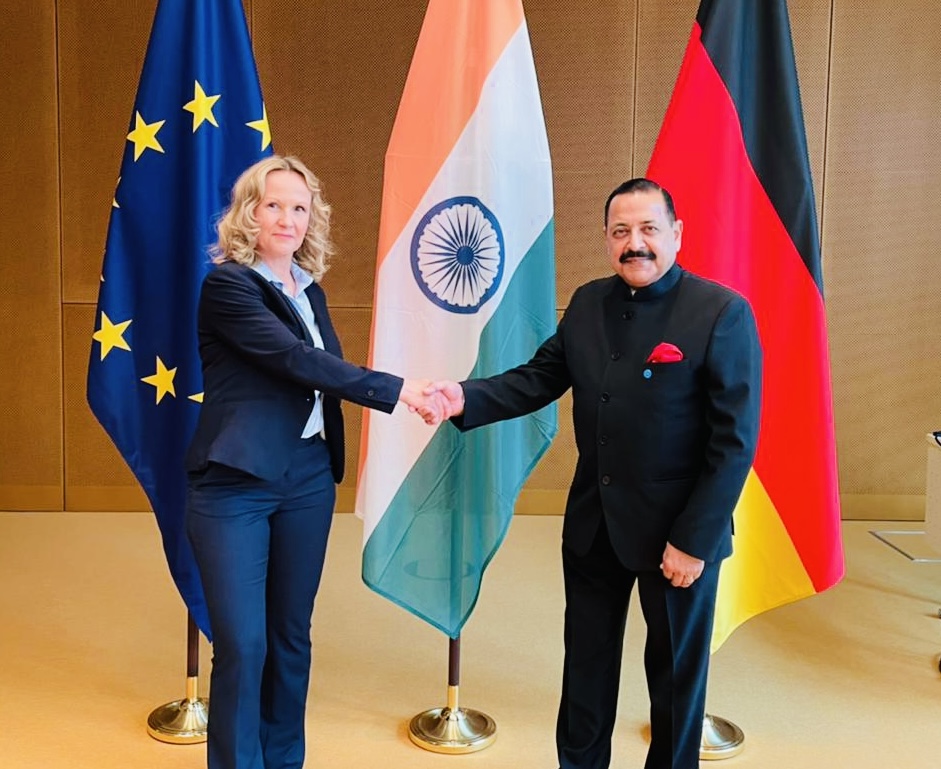BERLIN, May 2 : India today reiterated its commitment to climate and environmental causes and pointed out that we have launched the National Hydrogen Energy Mission and several such initiatives to fulfil India’s commitment at COP 26 of achieving net zero emissions by 2070.
On the 2nd day of his visit to Germany, Union Minister of State (Independent Charge) Science & Technology; Minister of State (Independent Charge) Earth Sciences; MoS PMO, Personnel, Public Grievances, Pensions, Atomic Energy and Space, Dr Jitendra Singh held “bilateral” talks with his counterpart, Ms. Steffi Lemke, Federal Minister for the Environment, Nature Conservation, Nuclear Safety and Consumer Protection in Berlin as part of the India-Germany Inter Governmental parleys.
The agenda of the meeting was Adaptation to climate change, Biological diversity, Oceans and Artificial intelligence for environmental protection.
In view of the imminent future challenges on the climate and weather, Dr Jitendra Singh expressed interest to augment our cooperation in this field including Model Development, Application of Forecasts in the renewable energy and of course use of Artificial Intelligence/Machine learning. He mentioned that Science & Technology has been one of the strategic pillars of bilateral partnership and suggested to explore possibilities of bilateral scientific cooperation in emerging areas of Weather and Climate Research, specifically, on trends of regional climate extremes and variability of vulnerable areas including tropics and high-latitudes.
Dr Jitendra Singh conveyed to his German counterpart that Indian Tsunami Early Warning Centre (ITEWC) at Indian National Centre for Ocean Information Services (INCOIS), Hyderabad provides early warning information for Tsunami related hazards to the Indian Ocean rim countries. He added that India has been recognized as one of the Tsunami Service Providers (TSP) under United Nations Educational, Scientific and Cultural Organization – Intergovernmental Oceanographic Commission (UNESCO-IOC) and invited Germany to make utilization of this opportunity.
Dr Jitendra Singh noted with satisfaction that India is working towards Probabilistic Tsunami Hazard Assessment (PTHA) in the Makran region through UNESCO-IOC and funded by UNESCAP, where German experts and institutions are part of this initiative.
For strengthening mutual collaboration between MoES institutions and German scientific/ research agencies, Dr Jitendra Singh he proposed to develop bilateral cooperation in areas of-Probabilistic Tsunami Hazard Assessments, Early detection of tsunamis including ‘atypical tsunami’ generated by the under-sea landslides triggered by earthquakes, Geodynamic modelling of Earth’s subsurface for submarine landslides and Crustal deformation monitoring using Global Navigation Satellite System(GNSS) data, Tectonic settings of subduction zones in the Indian Ocean (more emphasis on Makran Subduction Zone) and integrating Machine Learning methods, Capacity building activities to strengthen pre-disaster preparedness and risk reduction programmes such as Tsunami Ready, Cooperation in the area of long term Arctic (Polar) observations & studies and Cooperation in the field of Gas Hydrates and underwater drills.
For bilateral cooperation in Ocean Exploration, Dr Jitendra Singh highlighted that the Blue Economy is an important dimension of Vision New India and proposed joint collaboration in areas like Coastal Marine Spatial Planning and Tourism, Marine fisheries, aquaculture, and fish processing, Coastal and deep-sea mining and offshore energy.
Ms. Steffi Lemke, German Environment Minister reciprocated the proposal and briefed on German advancement in these areas and agreed to work out new collaboration.
Home Latest News Dr Jitendra holds ‘bilateral’ talks with German Environment Minister, reiterates India’s commitment


